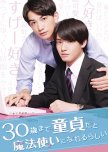30-sai made Dotei Da to Mahotsukai ni Nareru rashii
2 pessoas acharam esta resenha útil
by easterndelights
Sugar, spice and everything nice - Key secrets to a quaint midnight drama’s success
This review will be mainly about the main characters and actors.
There is something about Cherry Magic that is definitely binge-watch and rewatch worthy. No villains, no fuss and minimal angst throughout. The opening and ending songs are nice, although the overall soundtrack wasn’t as memorable to me but somewhat fits with the drama’s quirks.
The love between colleagues, friends and partners presented in this drama is as universal as it gets. It lets the viewers know it is okay to have no romantic attachment to anyone as long as you valued and be content with yourself. It lets the viewers know it is okay to shamelessly chasing your dreams as well as abandoning your past dreams in pursuit of something new and exciting. It lets the viewers know the importance of mutual consent, patience, understanding and good communication when it comes to loving someone who valued less of themselves.
As the actors of Kurosawa and Adachi, Machida Keita and Akaso Eiji put a lot of thoughts into how their actions correspond with each other whether those scenes are improv or not. Most of the scenes were delivered well non-verbally and voiceovers were added in later to showcase Adachi’s mind reading ability. Viewers who rewatch would definitely notice the slight touches added to the characters throughout the episodes.
Kurosawa is the character that some viewers could easily relate to if they have yearned and loved someone the same way Kurosawa did. Machida’s rendition of Kurosawa did bore some resemblance from Oliver in “Call Me By Your Name” - both characters possessed the same gentlemanly charms, the earnest to love wholeheartedly and the unfortunately good facade to maintain people’s expectations. It seems Machida might have drew some inspiration from CMBYN. Be rest assured that Cherry Magic’s screenwriter didn’t pull out an Oliver move in the end, or else the viewers would have gone full Elio mode.
Machida did micro-expression quite well and delivered his scenes with proper tension and impeccable chemistry when it comes to Akaso. It was a joy to see Machida’s soft and courteous mannerism after seeing many of his aggressive roles in other LDH-produced films or series.
Kurosawa could have easily become many viewers’ favourite and could have completely overshadow Adachi in this drama.
That’s what I have predicted initially and luckily that didn’t happened.
Akaso’s rendition of Adachi at first seemed to be a bit overly comical in first few episodes but gradually improving as Adachi gets closer with his peers. Some of Adachi’s comical scenes reminded me of Haruta from “Ossan’s Love” - as it turns out both actors are from the same talent agency.
Nonetheless there seemed to be some bits of Akaso in Adachi. In contrast with some of Akaso’s past acting roles, his other roles didn’t feel the same way as Adachi did. It felt as if Akaso has fully immersed himself in the role of Adachi, delivering Adachi’s vulnerability in a way that shines most during these crucial scenes with Machida (Note: confession scene in Episode 7; breakdown scene in Episode 11; rooftop scene in Episode 12).
Akaso’s innate boyish flairs and doe-like eyes emote awkwardly shy Adachi adorably despite being dressed less fashionable than his peers. Seeing how Adachi wavers emotionally and gradually becoming more braver and livelier because of the people around him is what made this drama worthwhile til the end.
Here’s my 2 cents to wrap up this review, there are some things that screenwriter, director or producer have to take note of when it comes to maintaining their viewers’ expectation. Teasing viewers with certain scenes that didn’t end up being delivered in the end could easily hampered with viewers’ overall experience of the drama. It is better not to tease at something that was never intended to be shown or included in script in the end.
Being able to show Adachi’s bit of validation towards Kurosawa like a peck on the forehead would have been a full circle to this story. Plus it could easily make my queer heart weak and this drama could have been an easy 10.
Special thanks to everyone who were involved in the making of this drama in the amidst of pandemic. It was enjoyable to have something endearing to look forward to every week.
There is something about Cherry Magic that is definitely binge-watch and rewatch worthy. No villains, no fuss and minimal angst throughout. The opening and ending songs are nice, although the overall soundtrack wasn’t as memorable to me but somewhat fits with the drama’s quirks.
The love between colleagues, friends and partners presented in this drama is as universal as it gets. It lets the viewers know it is okay to have no romantic attachment to anyone as long as you valued and be content with yourself. It lets the viewers know it is okay to shamelessly chasing your dreams as well as abandoning your past dreams in pursuit of something new and exciting. It lets the viewers know the importance of mutual consent, patience, understanding and good communication when it comes to loving someone who valued less of themselves.
As the actors of Kurosawa and Adachi, Machida Keita and Akaso Eiji put a lot of thoughts into how their actions correspond with each other whether those scenes are improv or not. Most of the scenes were delivered well non-verbally and voiceovers were added in later to showcase Adachi’s mind reading ability. Viewers who rewatch would definitely notice the slight touches added to the characters throughout the episodes.
Kurosawa is the character that some viewers could easily relate to if they have yearned and loved someone the same way Kurosawa did. Machida’s rendition of Kurosawa did bore some resemblance from Oliver in “Call Me By Your Name” - both characters possessed the same gentlemanly charms, the earnest to love wholeheartedly and the unfortunately good facade to maintain people’s expectations. It seems Machida might have drew some inspiration from CMBYN. Be rest assured that Cherry Magic’s screenwriter didn’t pull out an Oliver move in the end, or else the viewers would have gone full Elio mode.
Machida did micro-expression quite well and delivered his scenes with proper tension and impeccable chemistry when it comes to Akaso. It was a joy to see Machida’s soft and courteous mannerism after seeing many of his aggressive roles in other LDH-produced films or series.
Kurosawa could have easily become many viewers’ favourite and could have completely overshadow Adachi in this drama.
That’s what I have predicted initially and luckily that didn’t happened.
Akaso’s rendition of Adachi at first seemed to be a bit overly comical in first few episodes but gradually improving as Adachi gets closer with his peers. Some of Adachi’s comical scenes reminded me of Haruta from “Ossan’s Love” - as it turns out both actors are from the same talent agency.
Nonetheless there seemed to be some bits of Akaso in Adachi. In contrast with some of Akaso’s past acting roles, his other roles didn’t feel the same way as Adachi did. It felt as if Akaso has fully immersed himself in the role of Adachi, delivering Adachi’s vulnerability in a way that shines most during these crucial scenes with Machida (Note: confession scene in Episode 7; breakdown scene in Episode 11; rooftop scene in Episode 12).
Akaso’s innate boyish flairs and doe-like eyes emote awkwardly shy Adachi adorably despite being dressed less fashionable than his peers. Seeing how Adachi wavers emotionally and gradually becoming more braver and livelier because of the people around him is what made this drama worthwhile til the end.
Here’s my 2 cents to wrap up this review, there are some things that screenwriter, director or producer have to take note of when it comes to maintaining their viewers’ expectation. Teasing viewers with certain scenes that didn’t end up being delivered in the end could easily hampered with viewers’ overall experience of the drama. It is better not to tease at something that was never intended to be shown or included in script in the end.
Being able to show Adachi’s bit of validation towards Kurosawa like a peck on the forehead would have been a full circle to this story. Plus it could easily make my queer heart weak and this drama could have been an easy 10.
Special thanks to everyone who were involved in the making of this drama in the amidst of pandemic. It was enjoyable to have something endearing to look forward to every week.
Esta resenha foi útil para você?






